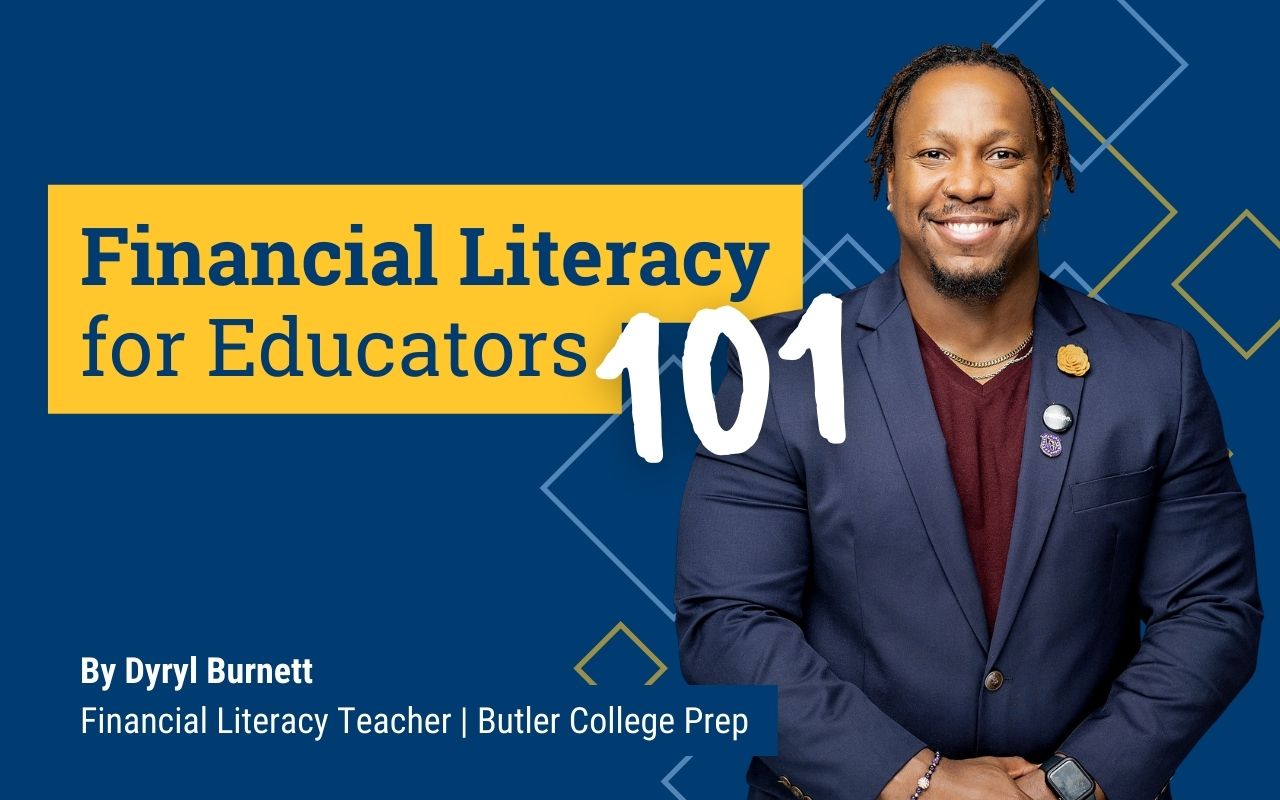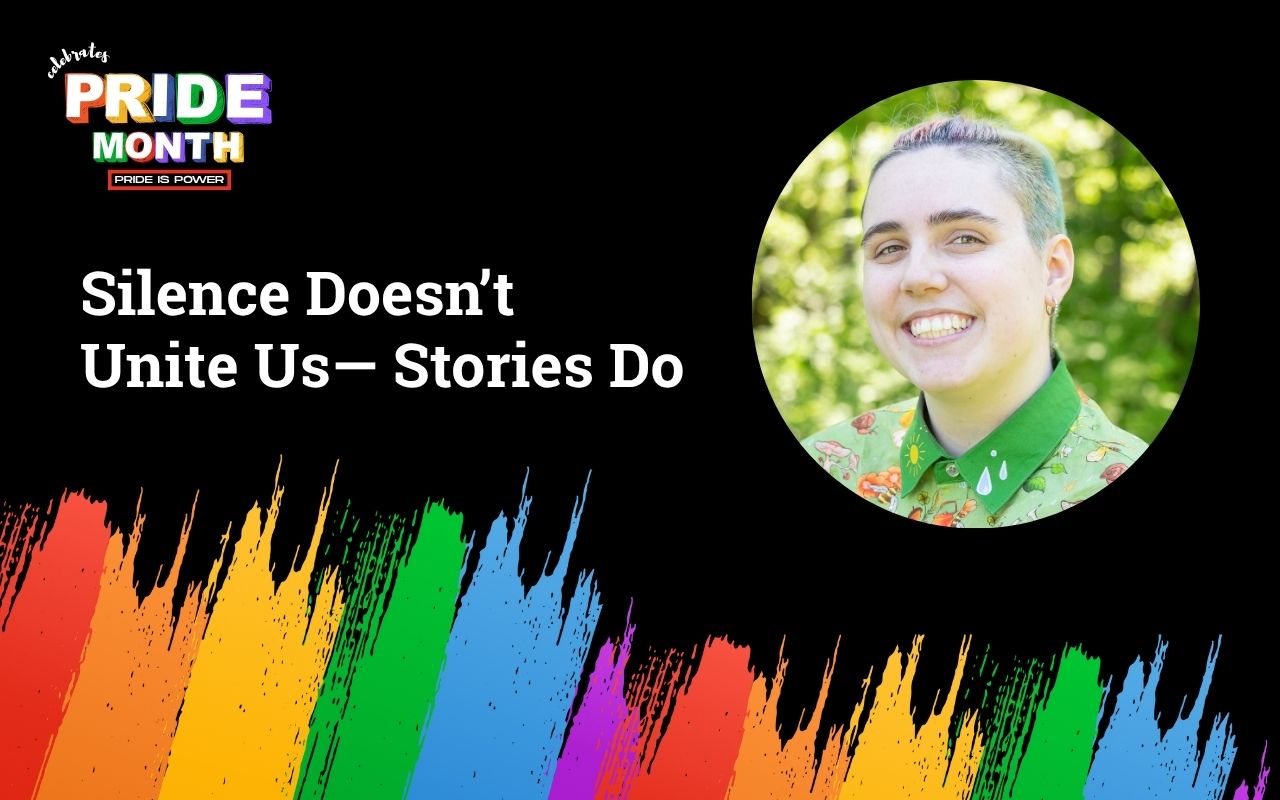
BY DYRYL BURNETT | he/him | Financial Literacy Teacher | Butler College Prep
As educators, we often put ourselves last. However, if you’re an educator, I have a “Do Now” that I hope you will read and seriously answer for yourself:
-
What financial goals have you established for yourself and/or your family?
-
Do you have a personal and/or family savings goal that you’re making progress on?
-
Do you have a budget that you are regularly updating and improving? What does that look like?
If any of these questions struck a nerve with you, then you might be interested in some of the knowledge I have shared as a financial literacy teacher for the past four years. But first, here’s a bit more about me:
Hi, I am Dyryl (Der•rell) Burnet, or “DB the Teacher.” I am blessed to be the financial literacy teacher at Butler College Prep and the financial literacy facilitator at Noble’s network-wide professional development sessions. I have several years where I served as a financial coach and speaker to adults in need of help with their budgets, debt payoff plans, and financial journey. I write to you all as a man who wears many hats: husband, father, adviser (the Melanated Marsai Martin Advisory!), teacher, PD facilitator, 12th-grade lead, a Diverse Leaders Fellow, and more.
Now, I didn’t ask those “Do Now” questions to frustrate you but to bring some focus and attention to the one person we educators typically save for last—ourselves! I completely understand that for many of us, this career is purpose-driven work that requires a lot of our time, mental and physical energy, and creativity. As the school year continues, it can be hard to focus on your own finances and remain disciplined in saving towards a financial goal when an all-inclusive vacation is calling your name after a stressful year. However, we have to think of the big picture.
In a recent The Hill article about more Americans living to 100, they referenced research by the United Nations that found that there were 89,739 centenarians (people who have reached the age of 100) living in the U.S. in 2021—more than double the number of centenarians from 20 years ago.
If we are not thinking about our lives and lifestyles once we are blessed to live as 70, 80, 90, and even 100-year-old folx, we need to step back and re-evaluate. We have to be thinking long-term, and one of the most important areas we need to consider is our finances. Here are some steps you can take to get started:
Make Financial Goals

“Setting financial goals helps ensure that you put your money towards what matters most to you.”
Before you do anything else, set some concrete financial goals. Financial goals help you put into perspective where you want to be financially, why you need (and want) to go there, and how to get there. This can make a huge impact in your life because it helps you shift your mindset. Society has overwhelmed us (and our students) with so many distractions, superficial standards, and meaningless ideologies that it can be difficult at times to focus on what is important. Setting financial goals helps ensure that you put your money towards what matters most to you.
For example, for me, my spiritual, mental, physical, and financial health must be at the root of life in order for me to show up for myself, my wife, my children, and my babies (students). To make this happen, I create yearly and quarterly goals. Yearly goals typically require more time or multiple phases that are achieved through my quarterly goals. Here are a couple of examples of goals I have set for myself:
I love investing in real estate and plan to do so for the rest of my life. Investing in rental properties allows for my wife and I to have additional income (if managed properly) and helps ease the financial pressures that come with being parents of soon-to-be high school freshman. Currently, my wife and I own a three-unit multi-unit building. When acquiring the building, we went into some debt due to renovations being needed on the property. One of my long-term goals is to purchase our second multi-unit building. To accomplish this, one of my quarterly goals is to remove the credit card debt from the property renovations.
Once all debts are paid off, another quarterly goal is to save $5,000 over the course of three months. Why save $5,000? As I stated earlier, my wife and I are about to have a high school freshman. As educators, we know all too well that our students are excited for the many milestones of high school—homecoming, dress-down days, getting their driver’s license & first car purchase, prom, college acceptance parties, and of course, graduation. Most of these milestones are expensive. If I don’t begin to prepare for the next four years, my daughter’s milestones can either be a financial headache or a financial blessing.
Here are some other examples of goals you can set—based on where you are:
- Read or listen to a book that will begin your financial journey and shift your mindset. I would suggest Rich Dad Poor Dad by Robert Kiyosaki and, my favorite, Richest Man in Babylon by George Clason. These two books were instrumental in shifting my mindset.
- If you are a first-year teacher making $54,000/year and have no savings, I would suggest saving $1,000-$3,000 for emergencies as one of your first financial goals.
- If you have the same salary but already have an emergency savings of $1,000 – $3,000, I would then posit that you save 5 months (one full semester) to 11 months (one full school year) of monthly expenses.
- For example, if your monthly expenses come to $2,750 per month, you should save a total of $13,750 in case you are not able to work for 5 months.
- For example, if your monthly expenses come to $2,750 per month, you should save a total of $13,750 in case you are not able to work for 5 months.
- Do you have any credit card debt? I recommend paying them down (this decreases your debt-to-income ratio and typically increases your credit scores). Set a goal to pay off 1-3 cards in a quarter or pay off a personal loan by the end of the year.
- As we approach summer break, every educator should have some time away to relax (in my humble opinion). Set a goal to save a couple thousand dollars for you and/or your family vacation (for us married folx, I DO suggest both solo and family vacations).
These are just a few of the goals we should ALL have for ourselves. Please do this first and do this now!
Homework: Create five to eight financial goals for yourself and/or your family. Set goals that will help you develop your fiscal mindset, relieve financial stress, bring joy & relaxation, and set you up for success later.
Build Your Savings

A 2024 Bankrate survey found that nearly half of all adults in the U.S. have less or no savings compared to a year ago. Another one of their surveys found that more than a third have more debt than cash reserves—the highest number on record—and 57% of adults said they could not afford a $1,000 emergency expense. Suffice to say, if you don’t have a savings fund, building one up should be one of your top financial goals!
“We are human, and life can come at us quickly and bring with it many circumstances that we can’t control. I don’t offer this information to shame, but I do want us all to live our best lives.”
A few years back, I remember when I was driving down Cottage Grove, and I hit one of Chicago’s infamous potholes. One of my front tires was in pretty bad shape, and I needed to get it fixed. Instead of asking someone for money or having to use a credit card (which will earn high interest if it is not paid off within that month), I was able to go to my savings and simply pay for a new tire.
Building a savings fund is also one of the simplest and most effective ways to become financially disciplined.
It is not always easy to deny yourself a gift and/or an outing with friends so that you can add funds to your savings account. I love sneakers, hats, and cologne, but there have been many months where I could not purchase those items so I could focus on meeting my savings goal. Many of us will pay our monthly household bills and our consumer debts (credit cards, auto and/or personal loans) but will either short-change or disregard our savings. A savings account will not make you rich or wealthy, but IT WILL build your discipline muscle. If you are disciplined to save $2,000, you can become disciplined to invest $500 per month into an index fund (a form of stock). If you are disciplined to save $15,000, then you definitely can be disciplined to purchase real estate properties (assets), yielding monthly returns.
Now, let me be clear, saving money will not be easy for everyone once you begin. For some, saving will be fun—almost like a game to see how much money you are able to stack before needing to use it. For others, this may feel hard and restrictive. Please understand that I have been able to save thousands of dollars, spend it, and then save again due to the grace I give myself. We are human, and life can come at us quickly and bring with it many circumstances that we can’t control. I don’t offer this information to shame, but I do want us all to live our best lives. One of the best ways to live well is to feel secure that you have a certain amount of money set aside for emergencies and large purchases. Do not overthink this part or think less of yourself, but please, begin to save what you can.
Homework:
- Find a good credit union or bank with a reasonable high-yield savings account (Navy Federal Credit Union, PenFed Credit Union, Ally, Marcus by Goldman Sachs) that is an entirely SEPARATE bank from your personal checking account.
- Set up direct deposit so that a small percentage of your net paycheck is deposited into your new savings account. (If you’re a Noble educator, you can do this in Paycom!)
- Determine your savings amount based on the financial goals you made in the last section. You got this!
Create a Budget

If building savings for emergencies and expenses is the door to your initial financial success, then your budget is the key to unlocking that door. There’s an infamous John Maxwell quote that I like: “A budget is telling your money where to go instead of wondering where it went.”
This quote keeps me centered when I’m creating and updating my family’s semi-monthly budget. My wife and I have routine financial meetings (Wednesday evenings) where we talk about bills, rare expenses that need to be covered (city stickers or oil changes), and events for that specific month (birthdays, holidays, and special occasions). We also go over our goals (currently paying down consumer debts) and hold each other accountable regarding our individual habits.
“I know firsthand how living paycheck to paycheck can decimate your long-term financial health and cause a lot of stress, frustration, disappointment, and anxiety. But, as Noble Schools educators, we all know that the way you reduce anxiety and frustration is by being clear, consistent, and connected—a budget helps you get there.”
The budget is the key component to your financial future, well-being, and generational wealth. A budget not only helps you build discipline, just like building your savings, but it tells you how much you can consistently put toward your savings account.
A common problem people encounter is that they feel like they make a decent income but still cannot seem to save money or pay all the bills on time. I know firsthand how living paycheck to paycheck can decimate your long-term financial health and cause a lot of stress, frustration, disappointment, and anxiety. But, as Noble Schools educators, we all know that the way you reduce anxiety and frustration is by being clear, consistent, and connected—a budget helps you get there (see what I did there?).
A budget is a lot like our unit and lesson plans. At the start or end of the school year, we start crafting our long-term plans that include the number of lesson units, how many assessments we’ll give, what standards & objectives we need to hit, etc. We know that we need this level of organization to hit learning goals for our students. A budget does the same thing for your financial goals. In order to meet your financial goals, you must know where your money is going so you can prevent overspending or having a negative cash flow as much as possible.
For example, I have a teenage daughter and a five-year-old son; it is very easy for us to overspend on groceries and fast food. But, by using my monthly budget, I control my money for each monthly expense to ensure I am achieving my financial goals and building my savings.
Homework: Create your budget and make it simple.
Similar to building savings, give yourself grace. It took me several years to develop (from scratch) the budget that I use today. You got this!







